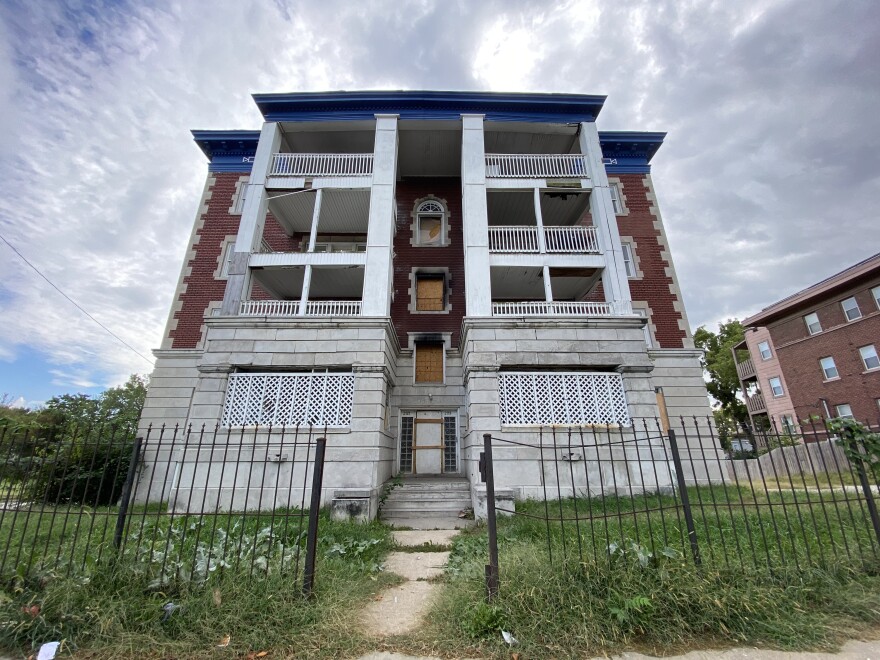The Kansas City Council approved a measure Thursday that sets out priorities for spending millions of dollars to support more affordable housing in the city.
The council voted unanimously in support of the housing trust fund measure, despite arguments from some critics that it won’t help enough tenants threatened with evictions and homelessness because of skyrocketing rents.
Mayor Quinton Lucas, who sponsored the ordinance, thanked everyone who worked to make the trust fund a worthwhile tool.
“I thank all who will continue to work on ensuring we develop more housing affordability in our community,” Lucas said.
The council approved a trust fund nearly three years ago, but it didn’t have any money in it until recently, when federal COVID-19 economic relief dollars became available.
The ordinance approved Thursday calls for the housing and community department to start the initial application process for choosing projects within 120 days. The city council can accept, reject or adjust the recommendations.
Units must be kept affordable for at least 30 years and preferably longer. That was increased from an earlier draft requiring 20 years. Lucas said 30 years should help ensure affordable housing doesn’t prematurely roll off to market rate, as has happened with some low-income housing tax credit investments.
The measure calls for spending at least 20% on affordable rental creation; 20% for affordable rental preservation; 10% on supportive housing for the homeless; and 10% for home ownership retention. That doesn’t add up to 100%, so it allows for more in each category.
“We think it is important to put in place some basic parameters now to ensure city staff has some direction from council,” AJ Herrmann, director of policy in the mayor’s office, told a council committee on Oct. 20.
At that neighborhood, planning and development committee discussion, Herrmann acknowledged that updates and changes to this framework will be required as new needs and funding sources emerge in coming years.
Herrmann explained the proposal doesn’t establish a governing board because there’s no community consensus yet on what the board’s power should be or who should serve.
But members of the KC Tenants advocacy group testified at the committee hearing said they considered the proposed framework to be a “slush fund” for developers. They said it didn’t do enough for very-low income households being taken advantage of by uncaring landlords. They also said the city’s definition of what’s “affordable,” with some monthly rents over $1,000, is still far too expensive for many families.
“We need a people’s housing trust fund with a governing board for people like me, who would listen to me,” said Javon Swopes, a single mother of four children and leader with KC Tenants. “My landlord is hurting our families. We need a people’s housing trust fund that would prioritize our homes, that would be affordable to us, to be accountable to us.”
Geoff Jolley, executive director with Kansas City’s Local Initiatives Support Corp. (LISC) that supports affordable housing, said the ordinance is a good start, but additional steps are needed.
He said 60,000 Kansas City households, including 40,000 renters and 20,000 homeowners, are struggling to pay for their housing. He supported a community-driven governing board including people facing housing instability.
Councilwoman Andrea Bough, an attorney specializing in real estate, land use and development, said the KC Tenants made good points.
“For a long time,” said Bough, “we’ve done things a certain way and listened to a lot of groups and I appreciate the voices that you have here now and we need to do more listening. This is our opportunity to do something real.”
She included ordinance language requiring the city manager to establish a housing trust fund advisory board, with members appointed by the mayor, and to report back to the council within 120 days.
While it tries to address long-term housing affordability, the city council is also attempting to tackle chronic homelessness, as freezing winter weather looms.
Bartle Hall is not available as an emergency warming center this winter. Instead the city’s plan calls for better collaboration with existing service providers and a more regional response to try to serve hundreds of people each night.
The city council on Thursday supported partnering with Amethyst Place, south of 27th and Troost, with $300,000 in pre-development funds for 34 new units for single mothers and their children. It continues to explore converting vacant hotel space into shelter apartments. But plans for some tiny “pallet” homes downtown are on hold.





